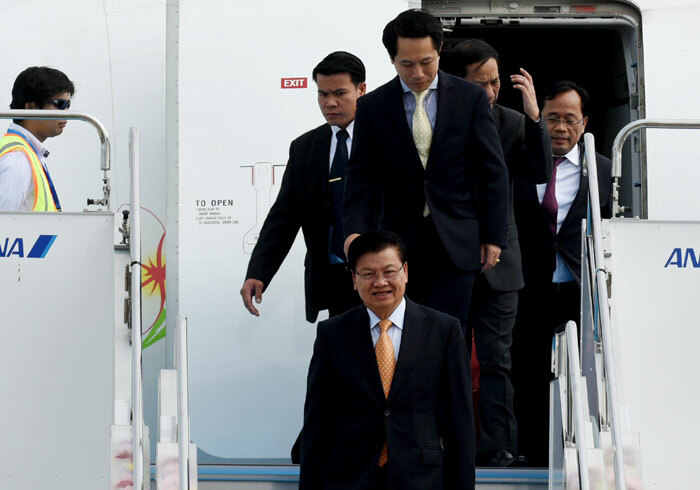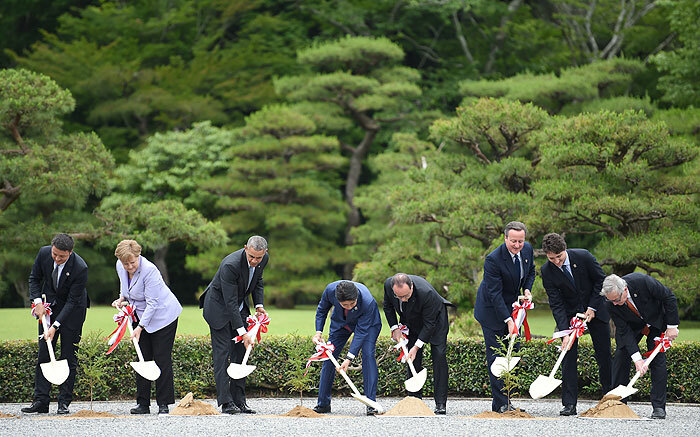China hits back as G7 opens in Japan
May 26, 2016
"G7 should focus on its own duties, that is economic cooperation, it should not point fingers at something outside its portfolio."

World leaders on Thursday kicked off talks dominated by the global economy and worries over China's growing clout -- and were told by Beijing to keep their noses out of its business.
Presidents and prime ministers from the Group of Seven rich nations are huddling in Japan for two days of discussions focused on how to stoke demand and encourage growth.
But China's growing assertiveness, particularly in bitter territorial disputes in the South China Sea was providing ever-louder background music, with European Council President Donald Tusk saying the group needed to take a "tough stance" on the hot-button issue.
Beijing swiftly launched a stinging broadside against the G7 -- Britain, Canada, France, Germany, Italy, Japan and the US -- which it said should not pursue "selfish interests".
"G7 should focus on its own duties, that is economic cooperation, it should not point fingers at something outside its portfolio," Chinese foreign ministry spokeswoman Hua Chunying said at a regular briefing in Beijing.
The Xinhua news agency, Beijing's official mouthpiece, reinforced the point with a blunt commentary that said the group "should mind its own business" and accused Japan of exploiting its host status to try to isolate China.
Both Washington and Tokyo -- which is locked in a separate dispute with Beijing over islands in the East China Sea -- have warned against China stoking tensions in the contested waters.
Beijing's rebuke came as the G7 opened its 2016 summit at Ise-Shima, a mountainous region about 300 kilometres (200 miles) southwest of Tokyo.
Leaders, including US President Barack Obama -- who is making a historic trip to the atomic-bombed city of Hiroshima on Friday -- visited Ise Jingu, a shrine complex that sits at the spiritual heart of Japan's native Shintoism.

Laos Prime Minister Thongloun Sisoulith (front) goes down the steps upon his arrival at the Chubu Centrair International airport in Tokoname city, Mie prefecture to attend the Group of Seven summit in Ise Shima. (Credit: AFP/Foreign Ministry of Japan)
Abe's decision to take his counterparts to the site -- also a hotspot for domestic tourists -- has raised eyebrows among some critics, however, who say Shinto retains some of the nationalist overtones with which it was imbued when it was the state religion.
After a working lunch, several of the G7 leaders -- including summit heartthrobs Matteo Renzi of Italy and Justin Trudeau of Canada -- got to grips with high-tech cars.
However their very low-key demonstration seemed chiefly to consist of being driven at low speed around a car park.
Several bilateral meetings were expected throughout the day, with Trudeau lined up to meet Germany's Angela Merkel and French leader Francois Hollande.
'Global crisis'
The sputtering global economy was centre stage in formal talks, although divisions are likely to remain over whether the world should spend or save its way out of the malaise, with Japan and Germany at odds on the issue.
The global refugee crisis was also a feature on the group's packed schedule.

The leaders take part in a tree planting ceremony on the grounds at Ise-Jingu Shrine in the city of Ise. (AFP)
Speaking on the sidelines of the meeting, the European Council's Tusk said the world needs to act together on an issue gripping Europe, and not leave the continent to battle the problem alone.
"We are aware that it is because of geography that the most responsibility is, and will continue to be, placed on Europe," Tusk told reporters.
"However we would also like the global community to show solidarity and recognise that this is a global crisis."
Last year, some 1.3 million refugees, mostly from conflict-ridden Syria and Iraq, asked for asylum in the European Union -- more than a third of them in Germany.
European Commission President Jean-Claude Juncker cautioned that Turkey must abide by the terms of a deal it has struck with the EU that will see Ankara stop migrants crossing into Europe in exchange for visa-free travel for its citizens.
Juncker was speaking after President Recep Tayyip Erdogan on Tuesday warned the EU his parliament could block laws related to the landmark deal.
"We do expect that Turkey will stick to its commitments -- and threats are not the best diplomatic instrument you can use," Juncker told reporters.
Britain's referendum next month on whether or not to stay in the European Union was also on the agenda.
"The atmosphere of our talks would be better if Britain is staying in the European Union," Juncker told reporters.
